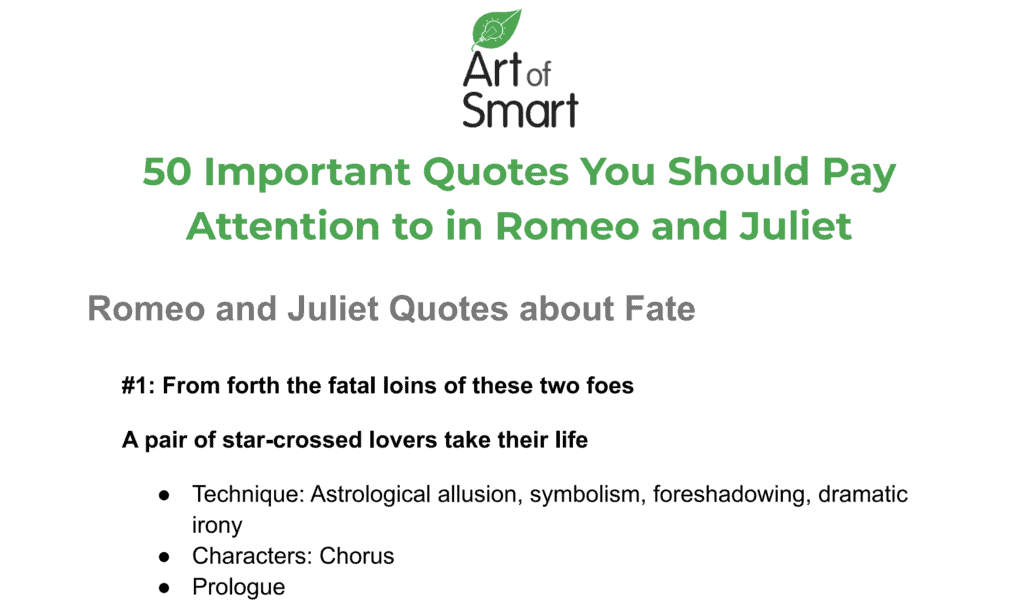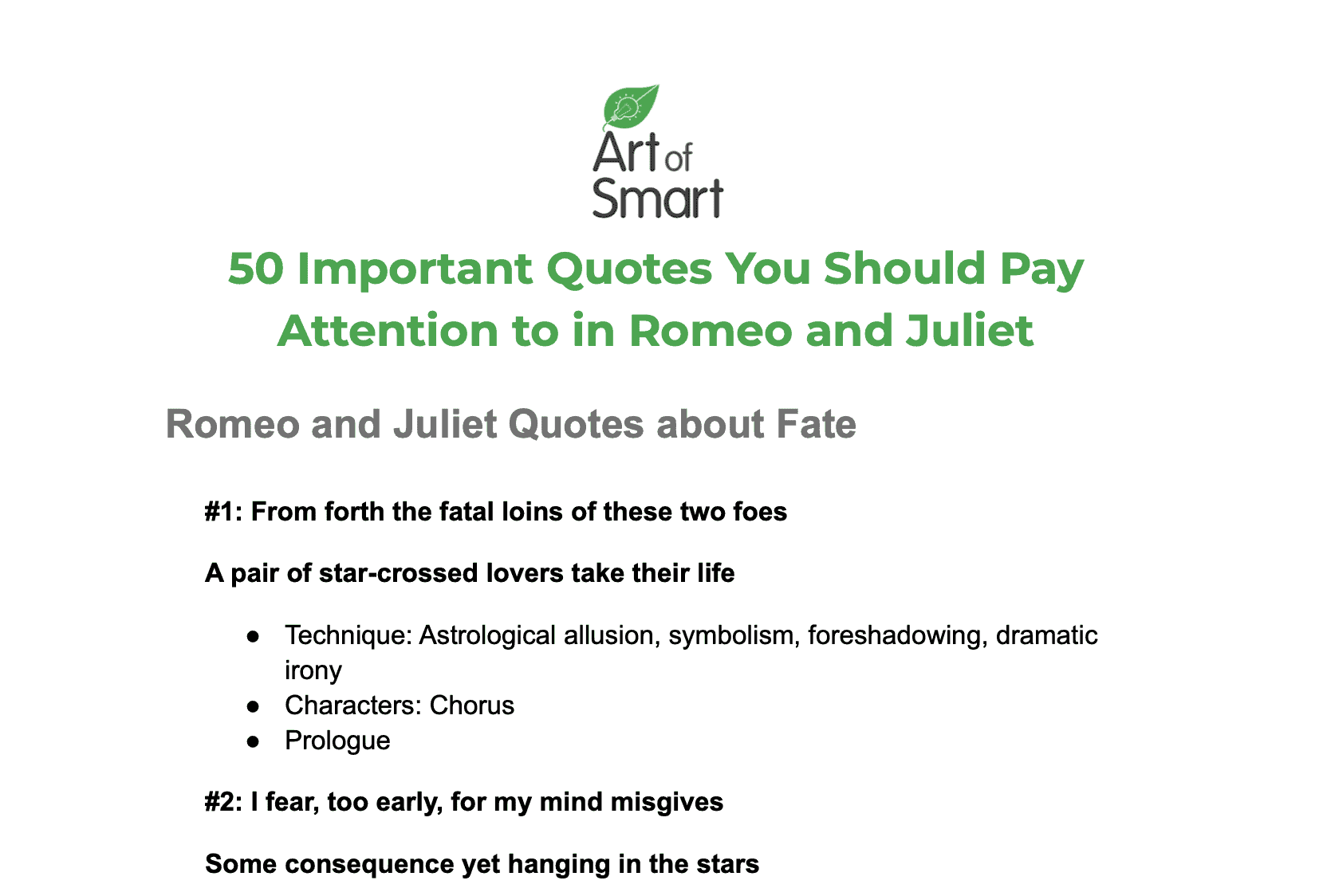Looking for good Romeo and Juliet quotes to use in your essay?
We’ve got you! Here are 50 quotes from Shakespeare’s Romeo and Juliet across themes of fate VS free will, love and conflict, and more, that can help you get started on writing your essay.
Dive right into our top quotes below!
Romeo and Juliet Quotes about Fate
Romeo and Juliet Quotes about Love
Romeo and Juliet Quotes about Death
Quotes from Friar Lawrence
Romeo and Juliet Quotes about Conflict
Romeo and Juliet Quotes about Hate
Quotes on The Dangers of Youth and Rebellion
Romeo and Juliet Quotes about Fate
#1: From forth the fatal loins of these two foes
A pair of star-crossed lovers take their life
- Technique: Astrological allusion, symbolism, foreshadowing, dramatic irony
- Characters: Chorus
- Prologue
Analysis:
The quote from Romeo and Juliet, “From forth the fatal loins of these two foes, A pair of star-crossed lovers take their life” makes use of several literary techniques that help to create meaning in the play.
Astrological allusion refers to the reference to astrology or the stars in the quote. The phrase “star-crossed lovers” suggests that the fates of Romeo and Juliet are tied to the stars, and that their love is doomed from the start due to some cosmic force beyond their control. This allusion serves to heighten the sense of tragedy and inevitability surrounding the lovers’ fate.
The use of symbolism in the quote is also noteworthy. The phrase “fatal loins” refers to the families of Romeo and Juliet, who are mortal enemies and whose conflict ultimately leads to the death of the two young lovers. This phrase serves as a symbol for the destructive power of family feuds and the consequences that can result from such conflicts.
The quote also makes use of foreshadowing, which is a technique that hints at future events in the story. The phrase “take their life” foreshadows the tragic deaths of Romeo and Juliet, which occur later in the play.
Finally, the quote also employs dramatic irony, which is a technique in which the audience knows something that the characters do not. In this case, the audience knows that Romeo and Juliet are destined to die, while the characters themselves are unaware of this fact. This creates a sense of tension and suspense, as the audience waits to see how and when the tragic outcome will unfold
#2: I fear, too early, for my mind misgives
Some consequence yet hanging in the stars
- Technique: Astrological allusion, symbolism, foreshadowing
- Characters: Romeo M.
- Act 1, Scene 4
#3: My grave is like to be my wedding bed.
- Technique: Foreshadowing, simile, dark imagery
- Characters: Juliet C.
- Act 1, Scene 5
#4: Prodigious birth of love it is to me
That I must love a loathed enemy
- Technique: Foreshadowing
- Characters: Juliet C.
- Act 1, Scene 5
#5: Ask for me to-morrow,
And you shall find me a grave man.
- Technique: Pun, foreshadowing
- Characters: Mercutio
- Act 3, Scene 1
#6: O, I am Fortune’s fool!
- Technique: Mythological allusion, metaphor
- Characters: Romeo
- Act 3, Scene 1
Analysis:
Romeo utters this line after he has killed Tybalt in a fit of anger and realises that his actions have brought about his own downfall. “O, I am Fortune’s fool” is Romeo’s way of saying that he has made a mistake that has brought misfortune upon himself. He believes that he has acted impulsively and that his fate is now controlled by luck or destiny, represented by the concept of “Fortune.”
Romeo feels that he has fallen victim to his own emotions and the unpredictable nature of life, and that he is now at the mercy of fate. He is acknowledging that his actions have consequences and that he is responsible for his own downfall. This quote highlights the tragedy of Romeo’s situation and the idea that fate can play a significant role in people’s lives. It also emphasises the idea that Romeo is a tragic hero who is brought down by his own weaknesses and mistakes.
#7: I have an ill-divining soul!
- Technique: Symbolism, foreshadowing, emotive language
- Characters: Juliet C.
- Act 3, Scene 5
#8: Methinks I see thee, now thou art below,
As one dead in the bottom of a tomb.
- Technique: Foreshadowing, high modality
- Characters: Juliet C.
- Act 3, Scene 5
#9: O Fortune, Fortune! All men call thee fickle
If thou art fickle, what dost thou with him
That is renown for faith? Be fickle, Fortune.
- Technique: Roman mythological allusion, anthropomorphism
- Characters: Juliet C.
- Act 3, Scene 5
#10: I have a faint cold fear thrills through my veins
That almost freezes up the heat of life.
- Technique: Metaphor, soliloquy, oxymoron, foreshadowing
- Characters: Juliet C.
- Act 4, Scene 3
Analysis:
She is expressing her fear and anxieties about the situation she finds herself in. She feels a cold fear that runs through her veins and almost stops the flow of life within her. The quote highlights the intense and overwhelming nature of Juliet’s fear, which is affecting her physically and emotionally.
The “faint cold fear” that Juliet is feeling is likely related to her impending marriage to Paris and her growing love for Romeo. She is aware of the dangerous and potentially deadly consequences of their relationship, and her fear is a reflection of the uncertain and unstable situation she finds herself in. The quote also highlights the idea that love and fear can exist side by side and that intense emotions can have a powerful impact on a person’s well-being.
#11: Then I defy you, stars!
- Technique: Astrological allusion, symbolism
- Characters: Romeo M.
- Act 5, Scene 1
Analysis:
The quote highlights the idea of Romeo defying fate and the forces of nature. By declaring “Then I defy you, stars!”, he is essentially rejecting the idea that his life is determined by the stars and the alignment of the planets. He believes that his love for Juliet is so strong that it transcends the laws of nature and fate. He is expressing his determination to be reunited with Juliet, despite the obstacles that may stand in his way.
The phrase “defy you, stars” is a metaphor for rejecting the idea that our lives are predetermined and controlled by forces beyond our control. Romeo is asserting his agency and his belief that he has the power to shape his own destiny.
In conclusion, this quote provides insight into Romeo’s character and his passionate love for Juliet. It highlights the theme of free will and the power of love to overcome obstacles and determine our fate. The metaphor of defying the stars is a powerful and romantic expression of this theme, and a testament to Romeo’s unwavering devotion to Juliet.
#12: O give me thy hand,
One write with me in sour misfortune’s book!
- Technique: Soliloquy, guilty tone
- Characters: Romeo M.
- Act 5, Scene 3
#13: A greater power than we can contradict
Hath thwarted our intents
- Technique: Biblical allusion, anthropomorphism
- Characters: Friar Lawrence
- Act 5, Scene 3
#14: O, here
Will I set up my everlasting rest,
And shake the yoke of inauspicious stars
From this world-wearied flesh!
- Technique: Celestial allusion, metaphor, dramatic irony
- Characters: Romeo M.
- Act 5, Scene 3
Quotes about Love
#15: Love is a smoke raised with the fume of sighs;
Being purged, a fire sparkling in lovers’ eyes;
Being vexed a sea nourish’d with loving tears:
- Technique: Metaphor, natural imagery, figurative language
- Characters: Romeo
- Act 1, Scene 1
#16: Alas that love, so gentle in his view,
Should be so tyrannous and rough in proof!
- Technique:Personification, symbolism, contrast
- Characters: Benvolio
- Act 1, Scene 1
#17: Here’s much to do with hate, but more with love.
Why then, O brawling love, O loving hate…
- Technique: Oxymoron, high modality
- Characters: Romeo M.
- Act 1, Scene 1
#18: This love feel I, that feel no love in this
- Technique: Chiasmus, emotive language
- Characters: Romeo
- Act 1, Scene 1
Analysis:
He is expressing his confusion and frustration over his own emotions. He says that he feels love, but that he doesn’t feel any love within himself.
The quote highlights the idea that love can be a confusing and contradictory experience. Romeo is deeply in love with Juliet, but he is also aware of the challenges and obstacles that their love faces. He is feeling a sense of internal conflict and is struggling to understand his own emotions.
The quote also suggests that love can be a powerful and transformative experience that can change a person’s life. Romeo is undergoing a significant emotional journey as a result of his love for Juliet, and this quote reflects the complex and contradictory feelings that he is experiencing.
In conclusion, this quote provides insight into Romeo’s character and his feelings towards love and the challenges he faces in his relationship with Juliet. It highlights the theme of the confusion and uncertainty that can accompany love, and how it can be both powerful and difficult at the same time.
#19: Is love a tender thing? It is too rough,
Too rude, too boist’rous, and it pricks like a thorn
- Technique: Simile, violent imagery, emphatic lines
- Characters: Romeo
- Act 1, Scene 4
#20: If love be rough with you, be rough with love
Prick love for pricking, and you beat love down.
- Technique: Repetition, chiasmus, violent imagery
- Characters: Mercutio
- Act 1, Scene 4
#21: I take thee at thy word:
Call me but love, and I’ll be new baptiz’d
Henceforth I will never be Romeo.
- Technique: Religious imagery, evocative language, symbolism
- Characters: Romeo M.
- Act 2, Scene 2
#22: It is the east, and Juliet is the sun.
- Technique: Celestial imagery, metaphor, monologue
- Characters: Romeo M.
- Act 2, Scene 2
He is using a metaphor to describe his feelings for Juliet. He says that Juliet is like the sun, and that she is the source of light and warmth in his life.
The quote highlights the idea that Juliet has a transformative and positive impact on Romeo’s life. Before he meets Juliet, Romeo is feeling lost and directionless, but her presence in his life brings light and happiness into his world. He sees her as the source of all that is good and positive, and he is filled with admiration and adoration for her.
The metaphor of the sun also highlights the idea of renewal and new beginnings. The sun rises in the east, and it symbolises the start of a new day and the potential for new experiences and opportunities. Similarly, Juliet represents a new chapter in Romeo’s life and a fresh start.
In conclusion, this quote provides insight into Romeo’s character and his feelings towards Juliet. It highlights the theme of the transformative power of love, and how it can bring light and happiness into a person’s life. The metaphor of the sun also suggests the idea of renewal and new beginnings, and the potential for positive change that love can bring.
Romeo and Juliet Quotes about Death
#23: Whose misadventur’d piteous overthrows
Doth, with their death, bury their parents’ strife
- Technique: Dramatic irony, foreshadowing
- Characters: Chorus
- Prologue
#24: Give me my Romeo, and when I shall die
Take him and cut him out in little stars,
And he will make the face of heaven so fine
That all the world will be in love with night
- Technique: Celestial imagery, soliloquy
- Characters: Juliet C.
- Act 3, Scene 2
#25: Death is my son-in-law; Death is my heir
- Technique: Dramatic irony, metaphor, anthropomorphism
- Characters: Juliet C.
- Act 4, Scene 5
#26: … I will stay with thee;
And never from this palace of dim night
Depart again…”
- Technique: Dramatic irony, emotive language, grieving tone
- Characters: Romeo M.
- Act 5, Scene 3
#27: The drugs are quick. Thus with a kiss I die.
- Technique: Symbolism, contrast
- Characters: Romeo M.
- Act 5, Scene 3
Quotes from Friar Lawrence
#28 And flecked darkness like a drunkard reels
- Technique: Symbolism, figurative language
- Characters: Friar Lawrence
- Act 2, Scene 2
#29: For naught so vile that on Earth doth live
But to Earth some special good doth give;
Nor aught so good but, strained from that fair use,
Revolts from true birth, stumbling on abuse
- Technique: Soliloquy, antithesis
- Characters: Friar Lawrence
- Act 2, Scene 3
#30: And thou art wedded to calamity
- Technique: Oxymoron, symbolism
- Characters: Friar Lawrence, Romeo
- Act 3, Scene 3
#31: Ah, what an unkind hour
Is guilty of this lamentable chance!
- Technique: Anthropomorphism, metaphor, grieving tone
- Characters: Friar Lawrence
- Act 5, Scene 3
Romeo and Juliet Quotes about Conflict
#32: For this alliance may so happy prove
To turn your households’ rancour to pure love
- Technique: High modality, hopeful tone
- Characters: Friar Lawrence
- Act 2, Scene 3
#33: I am hurt.
A plague o’both houses! I am sped.
Is he gone and hath nothing?
- Technique: Bubonic plague allusion, foreshadowing
- Characters: Mercutio
- Act 3, Scene 1
#34: O serpent heart, hid with a flow’ring face!
Did ever dragon keep so fair a cave?
Beautiful tyrant, fiend angelical!
- Technique: Oxymoron, symbolism, rhetorical question, emphatic verse
- Characters: Juliet C.
- Act 3, Scene 2
#35: O damned saint, an honourable villain!
- Technique: Oxymoron, symbolism, emphatic verse
- Characters: Juliet C.
- Act 3, Scene 2
#36: I dreamt my lady came and found me dead
And breathed such life with kisses in my lips
That I revived and was an emperor
- Technique: Monologue, symbolism
- Characters: Romeo,
- Act 5, Scene 1
#37: As rich shall Romeo’s by his lady’s lie;
Poor sacrifices of our enmity
- Technique: Grieving tone
- Characters: Capulet
- Act 5, Scene 3
Romeo and Juliet Quotes about Hate
#38: What, drawn and talk of peace? I hate the word
As I hate hell, all Montagues, and thee.
- Technique: Juxtaposition, characterisation of dramatic foil (Tybalt as a symbol of hate), biblical allusion
- Characters: Tybalt
- Act 1, Scene 1
#39: Why then, O brawling love! O loving hate!
O any thing, of nothing first create!
- Technique: Tricolon, contrast, personification, consonance, paradox
- Characters: Romeo
- Act 1, Scene 1
#40: My only love sprung from my only hate!
Too early seen unknown, and known too late!
- Technique: Dramatic irony, emotive language
- Characters: Juliet C.
- Act 1, Scene 5
#41: Virtue itself turns vice being misapplied
And vice sometime’s by action dignified
- Technique: Consonance, contrast, couplet, iambic pentameter
- Characters: Friar Lawrence
- Act 2, Scene 3
#42: O Romeo, Romeo,
wherefore art thou Romeo?
Deny thy father and refuse thy name,
Or if thou wilt not, be but sworn my love,
And I’ll no longer be a Capulet.
- Technique: Soliloquy, rhetorical question, repetition
- Characters: Juliet C.
- Act 2, Scene 1
Analysis:
The quote highlights the idea of the conflict between love and family loyalty. Juliet is asking Romeo to deny his identity as a Montague and become a member of the Capulet family, so that they can be together without any opposition from their families. She suggests that if he is unwilling to do so, then he should simply swear his love for her, and she will give up her own identity as a Capulet.
The phrase “wherefore art thou Romeo?” is a play on words that asks both “where are you?” and “why are you who you are?” Juliet is longing for a world where their love can exist without being opposed by their family names.
In conclusion, this quote provides insight into Juliet’s character and her love for Romeo. It highlights the theme of the power of love to overcome obstacles and the struggle between love and family loyalty. The play on words in the phrase “wherefore art thou Romeo?” is a clever expression of this theme and a testament to Juliet’s strong feelings for Romeo.
The Dangers of Youth and Rebellion
#43: Alas that love, whose view is muffled still,
Should without eyes see pathways to his will!
- Technique: Personification, symbolism, foreshadowing
- Characters: Romeo M.
- Act 1, Scene 1
#44: Alack, there lies more peril in thine eye
Than twenty of their swords! Look thou but sweet,
And I am proof against their enmity
- Technique: Dramatic irony, high modality, confident tone
- Characters: Romeo M.
- Act 1, Scene 5
#45: Did my heart love till now? Forswear it, sight,
For I ne’er saw true beauty till this night
- Technique: Rhetorical question, hyperbole, emotive language
- Characters: Romeo M.
- Act 1, Scene 5
#46: When King Cophetua loved the beggar maid.-
He heareth not, he stirreth not, he moveth not.
- Technique: Medieval allusion, metaphor
- Characters: Mercutio (about Romeo M.)
- Act 2, Scene 1
#47: By love, that first did prompt me to inquire.
He lent me counsel, and I lent him eyes.
- Technique: Personification, emotive language
- Characters: Romeo M.
- Act 2, Scene 2
#48: With love’s light wings did I o’er-perch these walls
For stony limits cannot hold love out,
- Technique: Symbolism, metaphor, religious allusion
- Characters: Romeo M.
- Act 2, Scene 2
#49: It is too rash, too unadvised, too sudden,
Too like lightning, which doth cease to be
- Technique: Simile, symbolism, soliloquy
- Characters: Juliet C.
- Act 2, Scene 2
#50: Wisely and slow; they stumble that run fast
- Technique: Foreshadowing, didacticism
- Characters: Friar Lawrence
- Act 2, Scene 3
#51: Like powder in a skilless soldier’s flask
- Technique: Simile, metaphor, foreshadowing
- Characters: Friar Lawrence (about Romeo M)
- Act 3, Scene 3
#52: O, bid me leap, rather than marry Paris
From battlements of yonder tower,
Or walk in thievish ways, or bid me lurk
Where serpents are.
- Technique: Morbid imagery, emotive language
- Characters: Juliet C.
- Act 4, Scene 1
#53: Where I have learn’d me to repent the sin
Of disobedient opposition
To you and your behest, and am enjoin’d
By holy Laurence to fall prostrate here
And beg your pardon
- Technique: Dramatic irony, contrast
- Characters: Juliet C.
- Act 4, Scene 2
On the hunt for quotes from other texts?
Check out our list of quotes for the following texts:
- Frankenstein
- A Streetcar Named Desire
- Fahrenheit 451
- To Kill a Mockingbird
- Never Let Me Go
- The Great Gatsby
- One Flew Over the Cuckoo’s Nest
- Jasper Jones
- The Curious Incident of the Dog in the Night-Time
- Billy Elliot
- The Stranger
We’ve also got articles specifically on plays by Shakespeare which you can check out below:
- King Lear
- A Midsummer Night’s Dream
- Macbeth
- The Merchant of Venice
- The Tempest
- Much Ado About Nothing
- Hamlet
- Othello
Looking for more insight on Shakespeare? Check out this biography of Shakespeare’s personal history and influences!
Are you looking for some extra help with studying Romeo and Juliet?
We have an incredible team of English tutors and mentors!
We can help you master your analysis of Romeo and Juliet by taking you through the summary, key characters, quotes and themes. We’ll also help you ace your upcoming English assessments with personalised lessons conducted one-on-one in your home, online or at one of our state of the art campuses in Hornsby or the Hills!
We’ve supported over 8,000 students over the last 11 years, and on average our students score mark improvements of over 20%!
To find out more and get started with an inspirational English tutor and mentor, get in touch today or give us a ring on 1300 267 888!
Kate Lynn Law graduated in 2017 with an all rounders HSC award and an ATAR of 97.65. Passionate about mentoring, she enjoys working with high school students to improve their academic, work and life skills in preparation for the HSC and what comes next. An avid blogger, Kate had administered a creative writing page for over 2000 people since 2013, writing to an international audience since her early teenage years.







